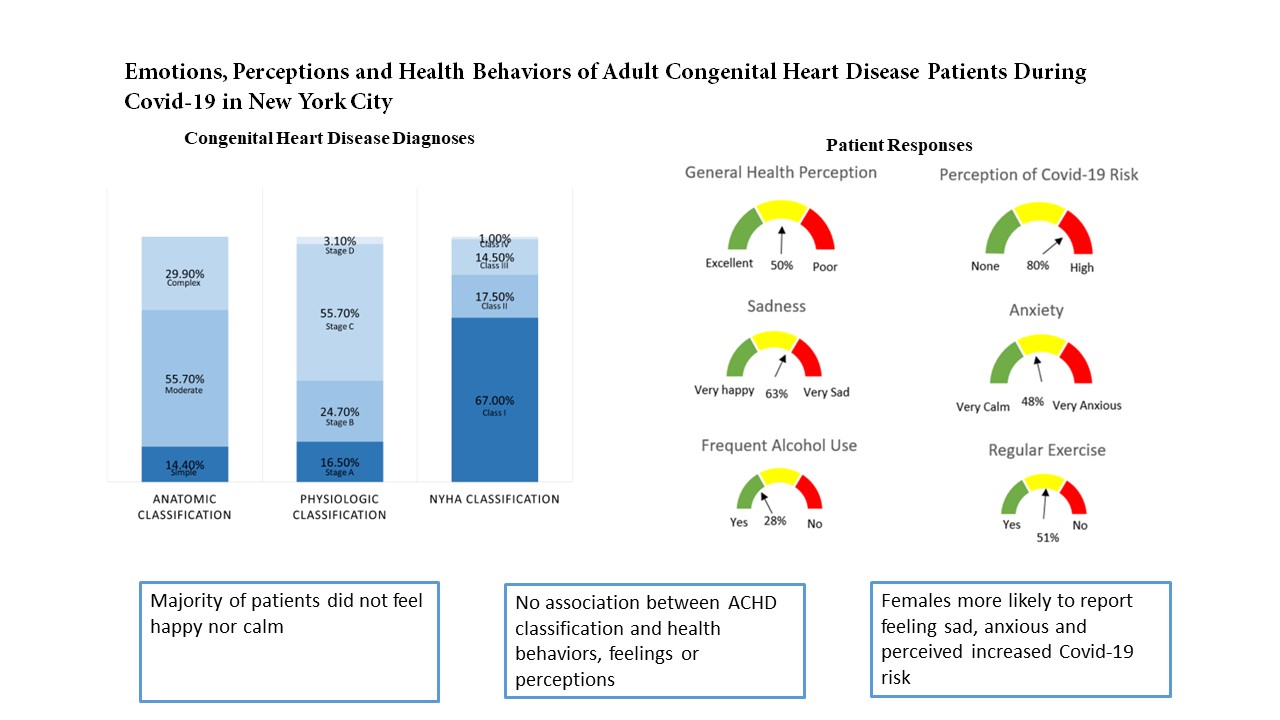 Open Access
Open Access
ARTICLE
Emotions, Perceptions and Health Behaviors of Adult Congenital Heart Disease Patients during COVID-19 in New York City
1 Leon H. Charney Division of Cardiology, NYU Grossman School of Medicine, New York, USA
2 Department of Medicine, NYU Grossman School of Medicine, New York, USA
3 Department of Psychiatry, NYU Grossman School of Medicine, New York, USA
4 Department of Cardiology, Mount Sinai Morningside, New York, USA
* Corresponding Author: Dan G. Halpern. Email:
Congenital Heart Disease 2022, 17(5), 519-531. https://doi.org/10.32604/chd.2022.024174
Received 25 May 2022; Accepted 25 July 2022; Issue published 06 September 2022
Abstract
Background: Adults with congenital heart disease (ACHD) have increased prevalence of mood and anxiety disorders. There are limited data regarding the influence of the COVID-19 pandemic on the mental health and health behaviors of these patients. Objective: The purpose is to evaluate the perceptions, emotions, and health behaviors of ACHD patients during the COVID-19 pandemic. Methods: In this cross-sectional study of ACHD patients, we administered surveys evaluating self-reported emotions, perceptions and health behaviors. Logistic regressions were performed to determine the adjusted odds of displaying each perception, emotion and health behavior based on predictor variables. Results: Ninety-seven patients (mean age 38.3 years, 46.4% female, 85.6% moderate or complex lesion) completed the survey. The majority of patients reported feeling moderately or very sad (63.1%), and 48.4% of patients identified themselves as feeling moderately or very anxious. The majority of patients perceived their risk of COVID-19 as moderate or high. Females were more likely to report feeling sad and anxious (95% CI 1.06–10.96, p-value 0.039, and 95% CI 1.44–15.30, p-value = 0.012, respectively), and were associated with higher odds of having a perceived increased risk of COVID-19 (95% CI 1.33–10.59, p-value 0.012). There was no association between ACHD anatomic or physiologic classification and perceptions, emotions and health behaviors. Conclusions: Females were more likely to report feeling sad, anxious and an increased risk of COVID-19 in comparison to males. These findings indicate the need for mental health support and promotion of health behaviors during the pandemic amongst all ACHD patients, regardless of underlying condition.Graphic Abstract

Keywords
Cite This Article
 Copyright © 2022 The Author(s). Published by Tech Science Press.
Copyright © 2022 The Author(s). Published by Tech Science Press.This work is licensed under a Creative Commons Attribution 4.0 International License , which permits unrestricted use, distribution, and reproduction in any medium, provided the original work is properly cited.


 Submit a Paper
Submit a Paper Propose a Special lssue
Propose a Special lssue View Full Text
View Full Text Download PDF
Download PDF Downloads
Downloads
 Citation Tools
Citation Tools